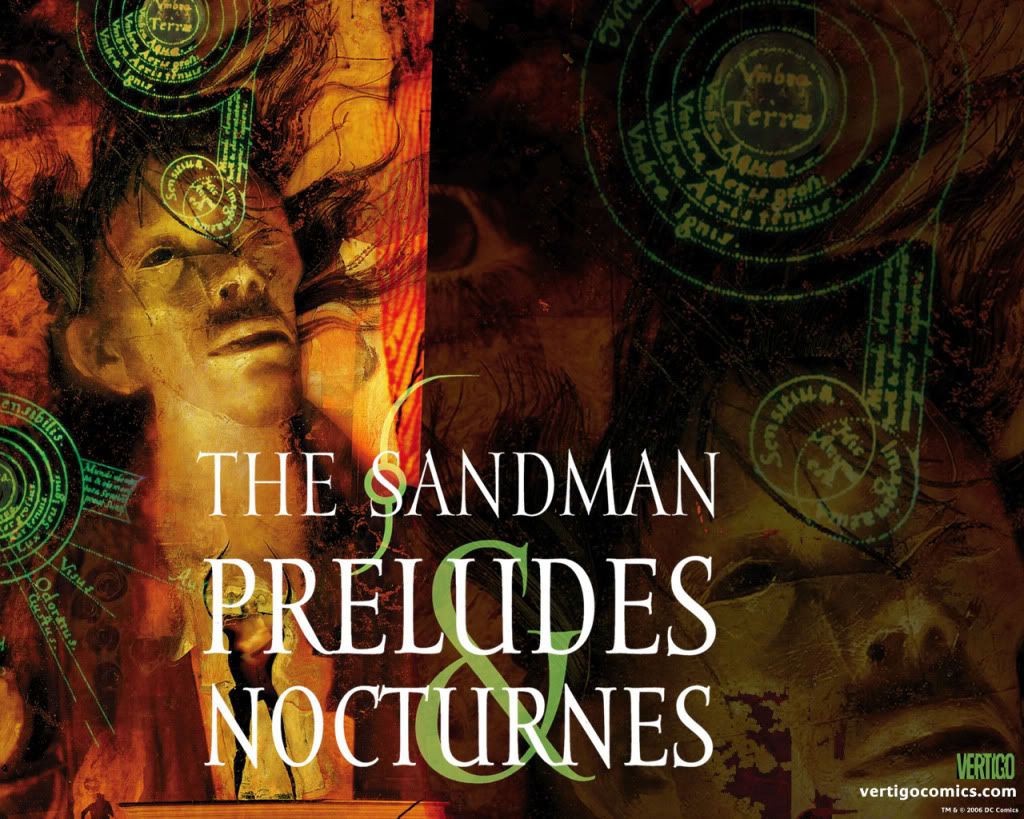
Ok, I freely admit, I remember every single thing about this issue. It's fairly impossible to forget unless you try to suppress it. This is the first issue where Gaiman no longer intimates darkness; he unleashes full horror.
You could almost read 24 Hours as a Greek tragedy, as one by one, the characters are punished for their hubris, and none more so than Bette, the waitress with whom Gaiman begins the story. She attempts to become a proto-Dream; all her customers are raw materials she moulds into stories. To Bette, her customers are more real as stories than as people.
She exerts artificial control over the stories; she ends them at happy points, not letting them carry on until death brings the inevitable end.
John Dee, in his horrifying way, acts with more honesty; he doesn't stop the story in the middle, death is the final destination of his own acts of creativity. We are introduced to his power in cinematic fashion; things start going very awry on the television. All we see of Dee is that he fingers Dream's ruby. It seems his power is very unfocused outside the diner, leading to random acts of depravity and madness, while inside the diner, he is the puppetmaster. And of course that's when things get creepy.
One interesting question is, at the point where people start revealing their "true selves," are they actually revealing themselves or truths or nightmare versions of themselves? The acts and prejudices described are almost too horrific for this random assortment of people to have possessed, and we do know that the ruby is the weapon of the Dream Lord, after all.
Next: Neil Gaiman forgets that John Dee is American, and I cannot concentrate on anything else because it's THAT annoying.


The shock I got from '24 Hours' was that of a guy who grew up on Asterix and ThunderCats and never knew a comic could make you to curl up into a whimpering little ball. Bloody hell. What a story.
ReplyDeleteFunnily enough, what I remembered most strongly from previous reads was Judy blinding herself; this time around it didn't stand out at all. This time it was Marsh and the crate of vodka, and Kate Fletcher in the mortuary. What's physical violence compared to that?
And I was struck by the same question: does Dee corrupt, or does he only reveal?
Another question: why is '24 Hours' so readable? Why isn't it just 20 pages of people doing depraved and icky things to each other? I think it's because Gaiman has a genius for making us care about people. If that sounds unbearably cheesy, let's say instead that he asks us not judge. Even if we don't like his characters we can still care about them, because humans are such strange and interesting things. Occasionally a character will do something truly wicked, but it's not hate that we feel - only pity.
On an entirely unrelated note: in one of the letters in the back of this issue a reader says that his favourite comics go well with music. Gaiman works a lot of songs into Sandman, and this time I'm determined to look up the ones I don't know. If you're not familiar with the Addams Family theme tune you miss the gag on page 15; makes me wonder how many 'unknown unknowns' are in there.
This section was insane. When I saw the beginning of it, I started remembering what I had long forgotten. The depth of it was so terrible.
ReplyDeleteI think what helps us affiliate with the characters here, moreso even than his own introduction to them through Bette's thoughts, was that we knew Dee for a while before this. You had a developed villain for the scene, and he had proven himself vicious when he killed the woman he forced to drive him. If he hadn't killed her, I think the dynamic would be completely different. You see them as eventual victims from the moment you know he's present, and you pity them.
I always felt, and this is my personal opinion, that he did not corrupt them or make them lie about what they had done. I think it is supposed to be a random assortment of people with their own faults and problems. They were pretty terrible, yes, but if you look at them and think about what the characters have been through in life, it doesn't seem impossible.
One of the more horrifying bits here, to me, was when he returned them to themselves, made them face what they had said and done that day. To have them in some dream-nightmare state doing things they never would and saying things to people that they had hidden, it would be infinitely kinder. Above even the killings, I think this was his cruelest trick.
I want to disagree, somewhat, about the waitress and her pride. Granted, she was very proud of her little secret and her stories, but it was, to me, a sadder thing, really. She makes these stories to overcome where she is in life. Further, it could be argued that, like the vigilante acting in place of Dream, her need to create happy stories was in the place of dreams that would normally have filled the nights. You call her a "proto-Dream," but what if that is more an in lieu of Dream?
-Peter